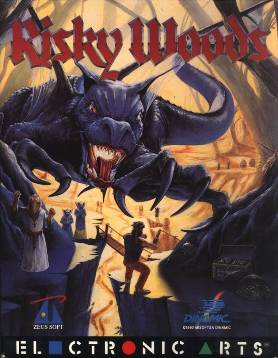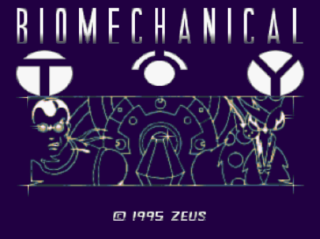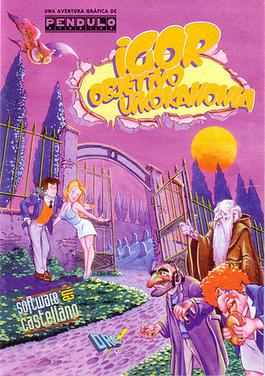
Broderbund Software, Inc. was an American maker of video games, educational software, and productivity tools. Broderbund is best known for the 8-bit video game hits Choplifter, Lode Runner, Karateka, and Prince of Persia, as well as The Print Shop—originally for printing signs and banners on dot matrix printers—and the Myst and Carmen Sandiego games. The company was founded in Eugene, Oregon, and moved to San Rafael, California, then later to Novato, California. Broderbund was purchased by SoftKey in 1998.
Dinamic Software was a Spanish video game producer and publishing company. It was founded in 1984, and its activity ceased in 1992, comprising the Golden Era of Spanish Software. One year later, a part of its owners founded an independent company named Dinamic Multimedia. At the end of the 1980s, another company, Aventuras AD, who began to produce text adventures, was born from Dinamic Software.
Ariolasoft GmbH, later known as United Software, was a German video game developer, publisher and distributor. It started in 1983 as the software subsidiary of Ariola Records, itself the record division of Germany's large Bertelsmann empire. From 1985 to 1988 Stephen Molyneux, formerly Head of Software at Atari International GmbH in Hamburg, held the position of Head of Software with responsibility for international negotiations and licensing of software at its headquarters in Munich. Ariolasoft also had a British subsidiary, Ariolasoft UK, which was run by Ashley Gray and Frank Brunger.

Runaway: A Road Adventure is a 2001 graphic adventure game developed by the Spanish company Pendulo Studios and published by Dinamic Multimedia. It follows the story of Brian Basco, an American college student on the run after he unwittingly saves a murder witness named Gina Timmins from assassination by the New York Mafia. Searching for clues about a mysterious crucifix linked to the murder, Brian and Gina embark on a cross-country journey through the United States while pursued by two Mafia hitmen. The player assumes the role of Brian and explores the game world while collecting items, solving puzzles and conversing with non-player characters.

Risky Woods is a fantasy-themed, side-scrolling platform game developed by Dinamic Software and Zeus Software and published by Electronic Arts in 1992. It was released as Jashin Draxos in Japan.

Living Books is a series of interactive read-along adventures aimed at children aged 3–9. Created by Mark Schlichting, the series was mostly developed by Living Books for CD-ROM and published by Broderbund for Mac OS and Microsoft Windows. Two decades after the original release, the series was re-released by Wanderful Interactive Storybooks for iOS and Android.
Alonso de Espina was a Spanish Franciscan Catholic preacher and writer. He was the author of Fortalitium Fidei, a treatise on arguments to be used to oppose detractors of Catholicism.
SoftKey International was a software company founded by Kevin O'Leary in 1986 in Toronto, Ontario. It was known as The Learning Company from 1995 to 1999 after acquiring The Learning Company and taking its name.

Biomechanical Toy is a scrolling run and gun video game released for arcades by Gaelco in 1995.
Opera Soft was a Spanish computer game developer of the Golden Era of Spanish Software of the 1980s. It released many games for the ZX Spectrum, Amstrad CPC and similar computers in the mid-1980s, but its games were not as popular on the PC. Founded in 1986, the company obtained success with its title Livingstone Supongo in the same year. The game is based on the 19th-century explorer Dr. Livingstone. Within Spain, one of their most popular games was La Abadía del Crimen, based on Umberto Eco's novel The Name of the Rose.

Bugaboo (The Flea), later published in Spain as La Pulga, is a video game written by the Spanish programming duo Paco Portalo and Paco Suarez for the ZX Spectrum and published by Quicksilva in 1983. It was later released for the Commodore 64 and MSX were produced. The Amstrad CPC port was published under the name Roland in the Caves using the Roland character.
Pendulo Studios S.L. is a Madrid-based video game developer founded in 1993 by Ramón Hernáez, Felipe Gómez Pinilla, Rafael Latiegui and Miguel Angel Ramos. Since the company's 1994 debut project, Igor: Objective Uikokahonia, it has specialized in graphic adventure games. Pendulo first achieved mainstream prominence in Spain via Hollywood Monsters (1997), which met with critical and commercial success in the country but was never released beyond Southern Europe.

Hollywood Monsters is a 1997 graphic adventure game developed by the Spanish company Pendulo Studios and published by Dinamic Multimedia. It takes place in an alternate-history 1950s, where the creatures from Golden Age monster movies are played by real monsters who lead otherwise normal lives. Controlling reporters Sue Bergman and Ron Ashman, the player seeks to unravel a mystery surrounding the murder of Frankenstein's monster. In the process, the player undertakes a globetrotting journey to locations like Transylvania and Egypt, while solving puzzles and interacting with characters such as Count Dracula, the Invisible Man and the Mummy.

Igor: Objective Uikokahonia is a 1994 graphic adventure game developed by the Spanish company Pendulo Studios and published by DROsoft. The game tells the story of Igor Parker, a university student in love with a classmate named Laura Wright. Hoping to win her affection, Igor surmounts a series of obstacles in an effort to join her on a field trip to the island paradise of Uikokahonia. The player assumes the role of Igor and navigates the campus while collecting items, solving puzzles and conversing with non-player characters.
The golden age of Spanish software was a time, between 1983 and 1992, when Spain became the second largest 8 bit computer entertainment software producer in Europe, only behind the United Kingdom. The disappearance of the 8 bit technology and its replacement by the 16 bit machines marked the end of this era, during which many software companies based in Spain launched their career: Dinamic Software, Topo Soft, Opera Soft, Made in Spain and Zigurat among others. The name Edad de oro del soft español was coined by specialized magazines of the time and has been used to refer to these years until nowadays.

Hundra is an action game developed by Spanish studio Zeus Software and published by Dinamic Software for the Amstrad CPC, MSX and ZX Spectrum in 1988. It was loosely inspired by the 1983 film Hundra but is not based on it.

Yenght: La Fuente de la Juventud is a Spanish interactive fiction game published in 1984 by Dinamic Software for the ZX Spectrum. It is written in BASIC. Yenght is the first game from Dinamic Software and the first graphic adventure game published in the Spanish market.
The history of video gaming in Spain dates back to the 1970s, and by 2014 the country was the 10th-highest-grossing market for video games worldwide. In 2018, the Spanish video game market posted a revenue of €1.53 billion, up from €1.35 billion in 2017. The country's audience of game players was 16.8 million that year; demographically, it was 59% male and 41% female. Reportedly 80% of people aged 6-to-10 played video games, while 24% of those in the 45–64 age range did so.

Capitán Sevilla is a 1988 platform video game developed by the Spanish group Hi-Score and published by Dinamic Software for the Amstrad CPC, MSX and ZX Spectrum. In the game, players assume the role of Mariano López, a transporter-turned superhero after eating a radiation-affected blood sausage to fight against the mad scientist Torrebruno and protect Earth.










